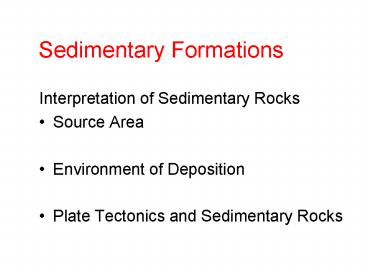Sedimentary Formations - PowerPoint PPT Presentation
1 / 36
Title:
Sedimentary Formations
Description:
Vertebrate (Fish) Fossil. Dinosaur Footprint. Sedimentary ... Schistose texture (platy or needle-shaped minerals grow in response to differential stress. ... – PowerPoint PPT presentation
Number of Views:40
Avg rating:3.0/5.0
Title: Sedimentary Formations
1
Sedimentary Formations
- Interpretation of Sedimentary Rocks
- Source Area
- Environment of Deposition
- Plate Tectonics and Sedimentary Rocks
2
Mud Cracks
3
Preserved mud cracks
4
Ripple Marks Model
Symmetric
Asymmetric
5
Tidal Flat Ripples
Current Direction
6
Preserved Ripple Marks
7
Preserved Bivalve Fossils
8
Vertebrate (Fish) Fossil
9
Dinosaur Footprint
10
Sedimentary Sequences on Mars
NASA-MOC image Candor Chasma - Each layer is 10
m thick
11
Formation Definitions
- Body of rock of considerable thickness
- Characteristics must be distinguishable from
adjacent units - Usually composed of one or more beds
- Often based on rock type (lithology or
lithofacies) - Contacts are the boundary surfaces between two
rock units of different lithology or age
12
Upper Grand Canyon Sequence
13
Marine Transgression and Regression
14
Distance from Source
15
Lithofacies - Paleocurrent Maps
16
Environments of Deposition
- Glacial Environments
- Alluvial Fan
- River Channel and Floodplain
- Lakes
- Marine Deltas
- Beach, Barrier Islands, Dunes
- Lagoon
- Shallow Marine Shelves
- Reefs
- Deep Marine Environments
17
Sedimentary Environments
18
Alluvial Fan Deposits - Baja, CA
Coarse channel deposit (conglomerate)
19
Fluvial Environments
20
Convergent Margin Environment
21
Rift Sedimentary Environment
22
Chapter 7Metamorphism, Metamorphic Rocks, and
Hydrothermal Rocks
.
23
The Rock Cycle
24
Factors Controlling the Characteristics of
Metamorphic Rocks
- Composition of the Parent Rock
- Temperature
- Pressure
- Fluids
- Time
25
Classification of Metamorphic Rocks
- Major Types of Metamorphism
- Contact Metamorphism
- Regional Metamorphism
- Prograde Increasing T P
- Retrograde Decreasing T P
- Shock Metamorphism
26
Plate Tectonics and Metamorphism
- Hydrothermal Processes
- Hydrothermal Activity at Divergent Plate
Boundaries - Metasomatism
- Hydrothermal Rocks and Minerals
- Sources of Water
27
Folded - Micas photomicrograph
2 cm
28
3.7 ByBP Amitsoq Gneiss
29
The Effect of Pressure
Pressure increases with depth Volume
decreases with depth
Hydrostatic Stress s1 s2 s3
30
Normal vs. Shear Stress
31
Flattened Pebbles
32
Normal vs. Shear Stress Fabric Development
Original Fabric
33
Fabric Terminology
- Metamorphic fabrics develop as a result of
differential (deviatoric) stress, i.e. stress is
NOT equal in all directions. - Foliation - Development of a planar texture or
fabric within the rock. - Lineation - Development of linear texture or
fabric within the rock. - Slaty cleavage (pre-existing platy minerals
aligned during metamorphism). - Schistose texture (platy or needle-shaped
minerals grow in response to differential stress.
34
Foliations and Lineations
35
Non-foliated rock - photomicrograph
36
Foliated rock - photomicrograph































